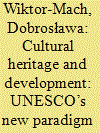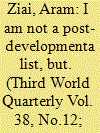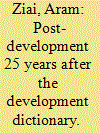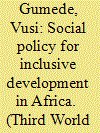| Srl | Item |
| 1 |
ID:
167574


|
|
|
|
|
| Summary/Abstract |
In the 1980s, the process of convergence between culture and development began to emerge in the context of post-colonialism and changing geopolitical realities. Later on, along with increasing multilateralism, The United Nations Educational, Scientific and Cultural Organization (UNESCO) eventually became the main actor in promoting culture as a fourth pillar of sustainable development. The paradigm shift in the heritage-development agenda is examined in the context of growing aspirations of non-Western states to play an active role in the global heritage regime, and the interests and strategies of UNESCO’s secretariat and the member states. At first, heritage and development were perceived as separate or opposed fields. Recently, a sustainable development framework emerged as a new global development model. UNESCO has engaged in the shaping of the United Nations (UN) 2030 agenda, and advocated a pragmatic approach to heritage. This paper examines the evolution of ideas and concepts linking ‘development’ and ‘heritage’ forged at the forum of UNESCO as part of its Culture and Development framework. The role of the Global South in the paradigm change is highlighted.
|
|
|
|
|
|
|
|
|
|
|
|
|
|
|
|
| 2 |
ID:
156654


|
|
|
|
|
| Summary/Abstract |
During the course of the 1990s, the Post-Development school emerged as an innovative though controversial approach in development studies. The article examines its critical reception in the textbooks and the extent to which its authors and arguments have become influential. It argues that the relationship between development studies and Post-Development is characterised simultaneously by (sometimes explicit, sometimes implicit) rejection and integration. Examining a number of current development studies textbooks, it illustrates the growing influence of Post-Development arguments and how they have been tacitly or consciously taken up while often rejecting Post-Development per se.
|
|
|
|
|
|
|
|
|
|
|
|
|
|
|
|
| 3 |
ID:
156643


|
|
|
|
|
| Summary/Abstract |
Few books in the history of development studies have had an impact like The Development Dictionary – A Guide to Knowledge as Power, which was edited by Wolfgang Sachs and published by Zed Books in 1992, and which was crucial in establishing what has become known as the Post-Development (PD) school. This special issue is devoted to the legacy of this book and thus to discussing PD.
|
|
|
|
|
|
|
|
|
|
|
|
|
|
|
|
| 4 |
ID:
157713


|
|
|
|
|
| Summary/Abstract |
The paper revisits the discourse on development in Africa, following in the footsteps of leading development thinkers and focusing on social policy. Some of the thinkers and scholars have specifically and directly discussed development discourse in Africa. Others have made insightful points regarding inclusive development in Africa even though not directly engaging with development discourse. The paper also acknowledges earlier thinking regarding development in Africa, including perspectives that deal with underdevelopment. The paper concerns itself with the critical role that social policy can play in ensuring inclusive development in Africa. The interface between economic and social policy is emphasised. Although Africa faces many intractable challenges, most of which are externally imposed, robust social policies will go a long way in bringing about effective social and economic development. In the main, though, Africa needs a comprehensive socio-economic development approach that can ensure lasting inclusive development. Social policies are critical for any development endeavour in African countries. Another main point that the paper makes is that economic transformation is not enough to fully advance wellbeing in Africa (and probably the world at large). By restructuring economies in Africa, not much would be achieved though some gains would be made.
|
|
|
|
|
|
|
|
|
|
|
|
|
|
|
|